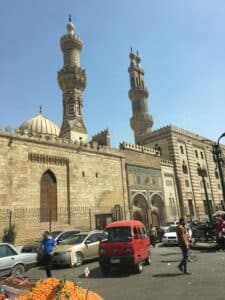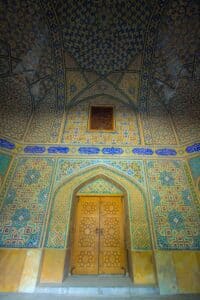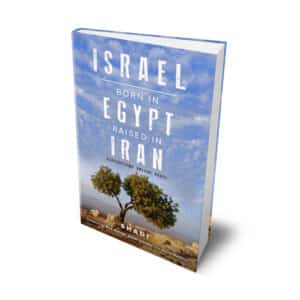For those with eyes to see, there’s a theme that runs throughout much of the Scriptures—from Mesopotamia in the east, then over to Israel, down to Egypt, and back again. Egypt in the south, Israel in the middle, and the old Assyrian empire in the east, back and forth, traversing the continents. This is not incidental. God has a carefully devised plan of salvation for Israel, and it includes all the nations around it.
Abraham made a number of trips to Egypt, and so did his son Isaac. There were even plagues involved and gifts of gold given on their hurried exit on more than one occasion. It’s one of the many times we see the story circling back on itself in a concentric spiral of significance. Jacob also got to Egypt eventually and found his long-lost son Joseph there, not dead as he supposed, but in charge of the whole country. The people of Israel eventually came back out of Egypt 400 years later in the Exodus. Even Jesus went to Egypt and back. It’s like the womb that gave birth to so much of Israel’s story.
An Arab man who was born in a Muslim country recently came with his own treasure to Jerusalem: a wonderful perspective on the story of Israel and what it means for the nations.
“When Joseph went to Egypt, he was able to save Israel,” Shadi said. “It was the beginning of the nation of Israel, they came out of Egypt. But the people who carried him there were the Ishmaelites, the traders. They took him into their destiny, and preserved the existence of Israel.”
Of course, this turn of events led to the preservation not just of Israel but saved Egypt and others from certain starvation as well. Israel was already being a blessing to the nations. But Shadi was pointing out the details of exactly how God executed His plan, and who He chose to include.
Part of the family
 “God could have used anyone, done it any other way,” Shadi pointed out, reminding us that the Ishmaelites played an important part in God’s plan. “They were not just on the side, but part of the story, an integral part of the process.”
“God could have used anyone, done it any other way,” Shadi pointed out, reminding us that the Ishmaelites played an important part in God’s plan. “They were not just on the side, but part of the story, an integral part of the process.”
Speaking of the patriarch of the Ishmaelites, Shadi reflected on some of the details concerning Abraham’s firstborn son. Ishmael’s mother, as you will remember, was the Egyptian slave girl, Hagar. Both Hagar and Ishmael were eventually separated from the tent of Abraham but, as Shadi points out, not before God brought in the covenant of circumcision. It is when Abraham is 99 years old, a full year before Isaac was born and even before the three visitors came to announce the timing, that God instigates this unusual family tradition in Genesis chapter 17. Abraham is still waiting for his promise, and Ishmael is now about 13 years old. “Oh that Ishmael might live before you!” Abraham cries out, wishing Ishmael could be the son of promise. No, is God’s reply. You will have a son with Sarah, and his name will be Isaac.
But will you look at that, God set up the covenant of circumcision just in time to include Ishmael. And he did it on purpose.
God tells Abraham, “Any uncircumcised male who is not circumcised in the flesh of his foreskin shall be cut off from his people; he has broken my covenant” (Genesis 17: 14).
So due to the timing of this interaction, Ishmael is not cut off. He is included in the covenant of circumcision and officially made part of the household.
Indeed, God goes on to bless Ishmael again right after this:
“As for Ishmael, I have heard you; behold, I have blessed him and will make him fruitful and multiply him greatly. He shall father twelve princes, and I will make him into a great nation. But I will establish my covenant with Isaac, whom Sarah shall bear to you at this time next year.”
“God deliberately included Ishmael in circumcision, it was an intentional choosing of Ishmael as part of the family,” Shadi emphasized. “Then the Angel of the Lord comes to save Ishmael and Hagar.” Shadi refers to Genesis 21 when Sarah told Abraham to cast them away, but God steps in to save. The Angel of God, who is one and the same with God, AKA Jesus:
And God heard the voice of the boy, and the angel of God called to Hagar from heaven and said to her, “What troubles you, Hagar? Fear not, for God has heard the voice of the boy where he is. Up! Lift up the boy, and hold him fast with your hand, for I will make him into a great nation.” (Genesis 21:17-18)
Jesus came to save the seed of Abraham and Hagar, the Egyptian, and He blessed them. Why? God had great plans for them.
God’s plans for the Ishmaelites
 Shadi continues to explain how this impacts us today: “Sons of Ishmael with healed hearts, those who know the Father’s love, are like a vehicle that can bring the gospel, to bring salvation to Israel” he says, referring back to the Ishmaelites who transported Joseph, and thus all of Israel, to Egypt, ensuring salvation from starvation and death. This is the pattern.
Shadi continues to explain how this impacts us today: “Sons of Ishmael with healed hearts, those who know the Father’s love, are like a vehicle that can bring the gospel, to bring salvation to Israel” he says, referring back to the Ishmaelites who transported Joseph, and thus all of Israel, to Egypt, ensuring salvation from starvation and death. This is the pattern.
Referring back to the words spoken over Ishmael’s destiny in Genesis 16, Shadi says it’s interesting that Ishmael is likened to a donkey:
“He shall be a wild donkey of a man, his hand against everyone and everyone’s hand against him, and he shall dwell over against all his kinsmen.” (Genesis 16:12)
“Remember it was a donkey carried Jesus, Yeshua, whose name means salvation, to Jerusalem,” Shadi said, drawing another parallel.
“One of the best things you can do for Israel is to pray for their Muslim neighbors. Jewish people need to be saved, and God wants to use Muslim background believers who have revelation about Israel.”
In other words, Ishmael can once again be the vehicle God provides to bring salvation to the children of Jacob.
The Isaiah 19 prophecy
The whole chapter of Isaiah 19 is focused almost entirely on Egypt with a few fascinating verses at the end that include Israel. God speaks of coming judgement, the drying up of the Nile, of civil war and oppressive tyrants, but He also promises salvation and revival for Egypt. And here is the all-important, powerful ending:
In that day there will be a highway from Egypt to Assyria, and Assyria will come into Egypt, and Egypt into Assyria, and the Egyptians will worship with the Assyrians.
In that day Israel will be the third with Egypt and Assyria, a blessing in the midst of the earth, whom the Lord of hosts has blessed, saying, “Blessed be Egypt my people, and Assyria the work of my hands, and Israel my inheritance.” (Isaiah 19:23-25)
Can you imagine? What a powerful trio that would make! In one of the biggest churches in Egypt, there’s a huge banner with the first half of the promise: “Blessed be Egypt my people”… but the bit about Israel conspicuously lopped off. The subject of Israel is controversial in the Egyptian church. However, in smaller groups, often hidden away from view, there are pockets of people who share God’s heart for Israel.
“Some would say that Isaiah 19 and the promise of the land from Egypt to the Euphrates was already settled on one level with Keturah,” said Shadi, referring to the second wife of Moses. “The Assyrian region is where the sons of Keturah went, so it’s all possessed by Abraham’s children. But there may be another level coming.”
Prophetically, there’s going to be an altar in land of Egypt. Then there’s Babylon and the Mesopotamian basin on the other side of Israel. Egypt’s Nile river in the south and the Euphrates in the north. The area of the old Assyrian empire is north and east of Israel, home to the Chaldeans, Babylonians and Persians, and has also had a big part to play in the biblical story—not least being where God called Abraham out of in the first place.
And here’s where Shadi dropped another fascinating observation.
The bookends to the story of Israel
Just as Israel is sandwiched between Egypt and Assyria, the story of Israel is sandwiched between an exodus from Egypt and a return from exile in Babylon, which became part of the Persian empire.
“Israel’s story starts in Egypt, but the end of the Hebrew Scriptures is coming back from the Persian Empire” Shadi reminds me. Persia is of course Iran today. He sees Egypt and Iran as key parts of Israel’s story. He has written about it in his book, Israel: Born in Egypt, Raised in Iran.
“Like bookends,” I offer.
“Yes, like bookends. Israel went into Egypt as a family, but came out as a nation of about a million people. And here’s the thing, The Israelites built the tabernacle to worship God with all the riches from Egypt. The Egyptians gave the gold, silver, precious stones and materials at the Exodus. Egypt gave Israel what it needed to worship.”
Moses told Pharaoh they wanted to go and worship God in the desert. That was the point. And Egypt helped them establish God’s ordained system of worship. Then at the other end of the story a thousand years later, when coming back to Israel after exile in what is now Iran, we see that it’s the Persians who make worship possible by helping Israel rebuild the temple.
 “In Isaiah 44,45 and Daniel 9 we see prophecy that’s fulfilled by Persian King Cyrus when he decrees rebuilding of Jerusalem. He gives them as much as they want from the treasury, as much as they need to build the temple. Then Darius re-issued the decree in the book of Nehemiah.”
“In Isaiah 44,45 and Daniel 9 we see prophecy that’s fulfilled by Persian King Cyrus when he decrees rebuilding of Jerusalem. He gives them as much as they want from the treasury, as much as they need to build the temple. Then Darius re-issued the decree in the book of Nehemiah.”
“Through Egypt and then Persia, Israel’s worship of God is established and then restored. The nation of Israel is chosen and raised to be a nation of worship, a kingdom of priests, and they are helped by Egypt and Iran to do that.”
Can you imagine if one day there are thousands of Muslim background believers, full of the love of Jesus, coming to share the gospel with Israelis? God is working his purposes out in Israel and the Middle East in wonderful ways. But as Daniel will tell you, it’s not enough to see God’s plans, He wants us to partner with Him in prayer!
Let’s pray:
- To bless Egyptian believers, that the church Egypt would be strong, united, and a powerful witness
- Pray for revelation among Egyptians about God’s heart for Israel
- Pray thousands of Muslims would come to faith, and have a heart to share the gospel with God’s chosen people
- Pray for peace and unity between believers across the Middle East, for there God commands His blessing.
You can find Shadi’s book, “Israel: Born in Egypt, Raised in Iran” on Amazon.

















